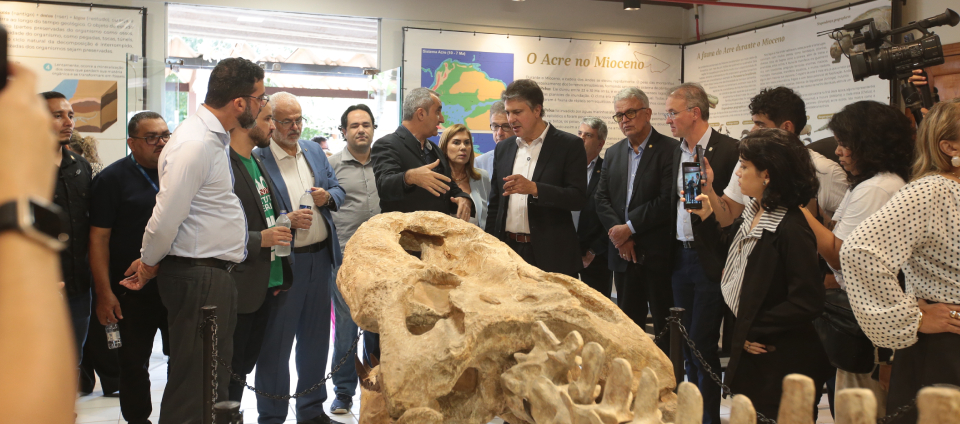ACRE
Israel defense minister says US should stand with Israel when it attacks Iran
PUBLICADO
1 ano atrásem
BEIRUT: Israel unleashed a wave of air strikes on Hezbollah’s southern Beirut stronghold on Wednesday night, Lebanese state media said, as the Iran-Hezbollah war reached its one-month mark.
With six buildings levelled in at least 17 Israeli raids, the strikes mark one of the most brutal nights in the capital’s southern suburbs since the war erupted on September 23.
Separately, Syria’s state media reported Israeli air strikes on a residential building in Damascus and a military site in Homs that killed a soldier and wounded seven others.
The raids came after United States Secretary of State Antony Blinken, on a visit to Israel, told the US ally to avoid further escalation with Iran.
Israel is fighting Iran-backed Palestinian militant group Hamas in Gaza and Hezbollah in Lebanon and has vowed to retaliate against Iran for an October 1 missile attack.
In Lebanon, the official National News Agency reported at least 17 Israeli strikes on Beirut’s southern suburbs, calling the raids “the most violent in the area since the beginning of the war.”
Six buildings were destroyed around the suburb of Laylaki, NNA said, including a residential complex hit by four Israeli strikes “causing a large fire.”
AFPTV footage showed a massive explosion followed by smaller blasts in the embattled suburb after the Israeli army issued an Arabic-language evacuation warning for the area, where Hezbollah holds sway.
There was no warning, however, for a strike that hit the Jnah neighborhood in southern Beirut.
That strike killed one person and wounded five others, according to Lebanon’s health ministry.
In southern Lebanon, Israeli strikes pounded Tyre, leaving swaths of its center in ruins and sparking a new exodus from the once vibrant coastal city.
“The whole city shook,” said resident Rana, who fled to the seafront after the Israeli military issued an evacuation warning.
Bilal Kashmar of Tyre’s disaster management unit said seven buildings were levelled and more than 400 apartments damaged.
“You could say that the entire city of Tyre is being evacuated,” he told AFP.
Black smoke was seen rising from several neighborhoods, with some areas just 500 meters (550 yards) from the city’s ancient ruins.
UNESCO said it was “closely following” the conflict’s impact on Tyre’s World Heritage site.
Blinken’s visit to the region, his 11th since the Gaza war began, was part of continued US efforts to end the war and limit its regional fallout.
The Gaza war began with Hamas’s October 7, 2023 attack on Israel, which resulted in the deaths of 1,206 people, mostly civilians, according to an AFP tally of Israeli official figures.
Israel’s retaliatory offensive has killed 42,792 people in Gaza, also mostly civilians, according to figures from the Hamas-run territory’s health ministry, data which the UN considers reliable.
Blinken said Israel had “achieved most of its strategic objectives” in Gaza and should now aim for lasting success.
“Now is the time to turn those successes into enduring, strategic success,” he said after meetings with Prime Minister Benjamin Netanyahu and other top officials.
Addressing Israel’s pledge to retaliate for Iran’s October 1 attack, he said: “It’s also very important that Israel respond in ways that do not create greater escalation.”
After Israel, Blinken visited Saudi Arabia, renewing his bid to broker a normalization of diplomatic ties between the two countries.
Speaking at a summit in Russia, Iran’s President Masoud Pezeshkian urged BRICS nations to help “end the war” in Gaza and Lebanon.
A Hamas official said a delegation led by a top official in the movement arrived in Moscow for talks.
Concerns are mounting over tens of thousands of civilians trapped by fighting in Gaza’s aid-starved north, where Israel launched a major air and ground assault this month.
Blinken acknowledged “progress” on aid for Gaza but said more needed to be done.
With winter approaching, displaced Gazans fear the cold.
Ahmad Al-Razz said he sewed sacks together to make his tent on the beach near Deir el-Balah.
“We are freezing every night because we are right by the sea, and we have no blankets or coverings to keep us warm,” said the 42-year-old.
The World Health Organization said it was forced to postpone the last phase of a polio vaccination drive in Gaza due to “intense bombardment” in the north.
The UN agency for Palestinian refugees said another of its workers had been killed in Gaza after a strike hit an UNRWA vehicle.
An AFP photographer reported a strike in the southern city of Khan Yunis, leaving a mangled aid truck and mourners gathered around two bodies.
After nearly a year of war with Hamas in Gaza, Israel shifted its focus to Lebanon last month, vowing to secure its northern border under fire from Hezbollah.
Israel has since ramped up its strikes on Hezbollah strongholds and sent in ground forces, in a war that has killed at least 1,580 people since September 23, according to an AFP tally of Lebanese health ministry figures.
The real number is likely to be higher due to gaps in the data.
Lebanese media said Israeli strikes hit areas of south and east Lebanon on Wednesday.
In the evening, pro-Iran broadcaster Al-Mayadeen said an Israeli strike hit an office it had vacated in Beirut.
Hezbollah said it had fired rockets in several areas of Israel, including a salvo that forced Israeli troops to “retreat behind the frontier” after they attempted to infiltrate from the outskirts of the south Lebanon village of Aitarun.
The Israeli army said air raid sirens sounded across central Israel after “projectiles” were fired from across the Lebanese border.
Netanyahu said on Wednesday that Israel had uncovered that Hezbollah had been plotting an “attack even greater than on October 7” involving jeeps, missiles and underground tunnels.
“They were planning an invasion,” the premier told French broadcasters CNews and Europe 1.
Also on Wednesday, Hezbollah confirmed the death of Hashem Safieddine, a cleric tipped to succeed the group’s slain leader Hassan Nasrallah, a day after Israel announced Safieddine’s death.
A Western diplomat meanwhile told AFP a number of Western countries had floated the idea of deploying international forces to Lebanon in the event of a ceasefire.
About 10,000 UN peacekeepers are already deployed in Lebanon’s south, but the diplomat said a separate multi-national troop deployment was under consideration.
Relacionado
VOCÊ PODE GOSTAR
ACRE
Em caravana, ministro da Educação, Camilo Santana, visita a Ufac — Universidade Federal do Acre
PUBLICADO
6 dias atrásem
25 de fevereiro de 2026A Ufac recebeu, nesta quarta-feira, 25, na Reitoria, campus-sede, a visita do ministro da Educação, Camilo Santana, no âmbito da caravana Aqui Tem MEC, iniciativa do Ministério da Educação voltada ao acompanhamento de ações e investimentos nas instituições federais de ensino.
Durante a agenda, o ministro destacou que a caravana tem percorrido instituições federais em diferentes Estados para conhecer a realidade de cada campus, dialogar com gestores e a comunidade acadêmica, além de acompanhar as demandas da educação pública federal.
Ao tratar dos investimentos relacionados à Ufac, a reitora Guida Aquino destacou a obra do campus Fronteira, em Brasileia, que conta com R$ 40 milhões em recursos do Novo Programa de Aceleração do Crescimento (PAC). A estrutura terá seis cursos, com salas de aula, laboratórios, restaurante universitário e biblioteca.
Abordando a visita, Guida ressaltou a importância da universidade para o Estado e a missão da educação pública. “A Ufac é a única universidade pública federal de ensino superior do Acre e, por isso, tem papel estratégico na formação e no desenvolvimento regional. A educação é que transforma vidas, transforma o país.”

Outro tema tratado durante a agenda foi a implantação do Hospital Universitário no Acre. Camilo Santana afirmou que o Estado é o único que ainda não conta com essa estrutura e informou que o governo federal dispõe de R$ 50 milhões, por meio do Novo PAC, para viabilizar adequações e a implantação da unidade.
Ele explicou que a prioridade continua sendo a concretização de uma parceria para doação de um hospital, mas afirmou que, se isso não ocorrer, o MEC buscará outra alternativa para garantir a instalação do serviço no Estado. “O importante é que nenhum Estado desse país deixe de ter um hospital universitário”, enfatizou.

Guida reforçou a importância do projeto e disse que o Hospital Universitário já poderia ser celebrado no Acre. Ao defender a iniciativa, contou que a unidade contribuiria para qualificar o atendimento, reduzir filas de tratamento fora de domicílio e atender melhor pacientes do interior, inclusive em casos ligados às doenças tropicais da Amazônia. Em tom crítico, declarou: “O cavalo selado, ele só passa uma vez”, ao se referir à oportunidade de implantação do hospital.
Após coletiva de imprensa, o ministro participou de reunião fechada com pró-reitores, gestores, políticos e parlamentares da bancada federal acreana, entre eles o senador Sérgio Petecão (PSD) e as deputadas Meire Serafim (União) e Socorro Neri (PP).
A comitiva do MEC foi formada pela secretária de Educação Básica, Kátia Schweickardt; pelo secretário de Educação Profissional e Tecnológica, Marcelo Bregagnoli; pelo secretário de Educação Superior, Marcus Vinicius David; e pelo presidente da Empresa Brasileira de Serviços Hospitalares, Arthur Chioro.
Laboratório de Paleontologia
Depois de participar de reunião, Camilo Santana visitou o Laboratório de Paleontologia da Ufac. O professor Edson Guilherme, coordenador do espaço, apresentou o acervo científico ao ministro e destacou a importância da estrutura para o avanço das pesquisas no Acre. O laboratório foi reformulado, ampliado e recentemente reinaugurado.

Aberto para visitação de segunda a sexta-feira, em horário de expediente, exceto feriados, o local reúne fósseis originais e réplicas de animais que viveram no período do Mioceno, quando o oeste amazônico era dominado por grandes sistemas de rios e lagos. A entrada é gratuita e a visitação é aberta a estudantes e à comunidade em geral.
Relacionado
A Pró‑Reitoria de Graduação (Prograd) da Universidade Federal do Acre (Ufac) é o órgão responsável pelo planejamento, coordenação e supervisão das atividades acadêmicas relacionadas ao ensino de graduação. Sua atuação está centrada em fortalecer a formação universitária, promovendo políticas e diretrizes que assegurem a qualidade, a integração pedagógica e o desenvolvimento dos cursos de bacharelado, licenciatura e demais formações presenciais e a distância. A Prograd articula ações com as unidades acadêmicas, órgãos colegiados e a comunidade universitária, garantindo que os currículos e práticas pedagógicas estejam alinhados aos objetivos institucionais.
Entre as principais atribuições da Prograd estão a coordenação da política de ensino, a supervisão de programas de bolsas voltadas à graduação, a análise e encaminhamento de propostas normativas e a participação em iniciativas que promovem a reflexão e o diálogo sobre o ensino superior.
A Prograd é organizada em três diretorias, cada uma com funções específicas e complementares:
Diretoria de Apoio ao Desenvolvimento do Ensino — responsável por ações estratégicas voltadas ao desenvolvimento de metodologias, à regulação e ao apoio pedagógico dos cursos de graduação.
Diretoria de Apoio à Formação Acadêmica — dedicada a acompanhar e apoiar as atividades acadêmicas dos estudantes, incluindo estágios, mobilidade estudantil e acompanhamento da formação acadêmica.
Diretoria de Apoio à Interiorização e Programas Especiais — voltada à gestão de programas especiais, políticas de interiorização e ações que ampliam o acesso e a permanência dos alunos em diferentes regiões.
A Prograd participa, ainda, de iniciativas que promovem a reflexão e o diálogo sobre o ensino superior, integrando docentes, estudantes e gestores em fóruns, encontros e ações que visam à atualização contínua dos processos formativos e ao atendimento das demandas sociais contemporâneas.
Com compromisso institucional, a Pró‑Reitoria de Graduação contribui para que a UFAC cumpra seu papel educativo, formando profissionais críticos e comprometidos com as realidades local e regional, garantindo um ambiente acadêmico de excelência e responsabilidade social.
Ednacelí Abreu Damasceno
Pró-Reitora de Graduação
Relacionado
ACRE
Orientação sobre revalidação e reconhecimento de diplomas — Universidade Federal do Acre
PUBLICADO
7 dias atrásem
24 de fevereiro de 2026Orientações para abertura de processo administrativo e procedimentos acerca da revalidação de diploma de graduação e reconhecimento de diplomas de pósgraduação stricto sensu emitidos por instituições estrangeiras, conforme a Resolução CEPEX Nº 003, de 14 de março de 2017.
Abertura do Processo
I – Preenchimento do Formulário Padrão (conforme modelo disponibilizado);
II – Documentos pessoais exigidos:
• Cópia do documento de identidade para brasileiros ou naturalizados, e, se estrangeiro, cópia da identidade e do visto permanente, expedido pela Superintendência da Polícia Federal, ou passaporte com visto permanente, concedido pela autoridade competente;
• Comprovante de residência;
• Comprovante de quitação com o serviço militar, para brasileiros do sexo masculino;
• Comprovante de quitação com o serviço eleitoral, para brasileiros e naturalizados;
III – Documentos acadêmicos exigidos:
• Para revalidação, conforme Art. 10, da resolução CEPEX Nº 003, de 14 de março de 2017.
• Para reconhecimento, conforme Art. 33, da resolução CEPEX Nº 003, de 14 de março de 2017.
IV – Preenchimento do Termo de aceitação, exclusividade e autenticidade, conforme modelo disponibilizado pelo NURCA;
V – Solicitação de abertura de processo no Protocolo Geral da UFAC, direcionado ao NURCA, com a apresentação da documentação exigida nos itens de I a IV;
Submissão da documentação na Plataforma Carolina Bori – Link: http://plataformacarolinabori.mec.gov.br
O interessado deve submeter a documentação no formato .pdf, agrupando diferentes documentos em arquivo único conforme indicado abaixo:
Arquivo 1 em .PDF:
1. Formulário Padrão preenchido (conforme modelo disponibilizado);
2. Documentos pessoais exigidos:
a) Cópia do documento de identidade para brasileiros ou naturalizados, e, se estrangeiro, cópia da identidade e do visto permanente, expedido pela Superintendência da Polícia Federal, ou passaporte com visto permanente, concedido pela autoridade competente;
b) Comprovante de residência;
c) Comprovante de quitação com o serviço militar, para brasileiros do sexo masculino;
d) Comprovante de quitação com o serviço eleitoral, para brasileiros e naturalizados;
Arquivo 2 em PDF:
1. Diploma e Histórico (Itens I e II do Artigo 10 ou Itens II e IV do artigo 33 da Resolução nº 003, de 14 de março de 2017);
Arquivo 3 em PDF:
1. Documentos acadêmicos exigidos excetuando-se os do Arquivo 2:
a) Para revalidação, conforme Art. 10, da resolução CEPEX Nº 003, de 14 de março de 2017.
b) Para reconhecimento, conforme Art. 33, da resolução CEPEX Nº 003, de 14 de março de 2017, excetuando item III (vide Arquivo 5).
Arquivo 4 em PDF:
1.Termo de aceitação, exclusividade e autenticidade, preenchido conforme modelo disponibilizado pelo NURCA; da resolução CEPEX Nº 003, de 14 de março de 2017.
Arquivo 5 em PDF:
a) Para os casos de reconhecimento: Exemplar digital da tese ou dissertação com registro de aprovação da banca examinadora e documentações complementares, conforme item III do Art. 33 da resolução CEPEX Nº 003, de 14 de março de 2017.
Fluxo do Processo
VI – Recebimento do processo pelo NURCA e encaminhamento para o Centro pertinente, que constituirá Comissão;
VII – Retorno do processo ao NURCA no prazo de 15 dias;
VIII – Sendo favorável o parecer da Comissão, será autorizada a emissão de GRU, bem como, o seu devido pagamento (R$ 1.200,00 – graduação; mestrado – R$ 1.500,00 e doutorado R$ 2.000,00), devendo ser incluída a via original ou cópia autenticada por servidor da UFAC no processo de revalidação.
a) Em caso de parecer negativo, o processo será disponibilizado para consulta, retirada de documentação e/ou ajuste quando for pertinente.
IX – Retorno do processo ao Centro para a Comissão concluir a revalidação no prazo restante dos seis meses.
Termo de Aceitação, Exclusividade e Autenticidade
_________________________________________________________________________________________________________
Links Úteis
Warning: Undefined variable $user_ID in /home/u824415267/domains/acre.com.br/public_html/wp-content/themes/zox-news/comments.php on line 48
You must be logged in to post a comment Login